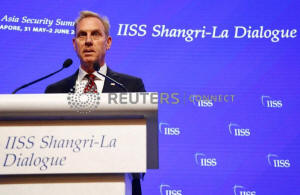|
U.S. won't 'tiptoe' around China with
Asia stability at threat: defense chief
 Send a link to a friend
Send a link to a friend
 [June 01, 2019]
By Idrees Ali [June 01, 2019]
By Idrees Ali
SINGAPORE (Reuters) - The United States
will no longer "tiptoe" around Chinese behavior in Asia, with stability
in the region threatened on issues ranging from the South China Sea to
Taiwan, acting U.S. Defense Secretary Patrick Shanahan said on Saturday.
Shanahan did not directly name China when making accusations of "actors"
destabilizing the region, but went on to say the United States would not
ignore Chinese behavior, the latest in the exchange of acerbic remarks
between the world's two biggest economies. He added, however, he was
keen to foster a military relationship with Beijing.
"Perhaps the greatest long-term threat to the vital interests of states
across this region comes from actors who seek to undermine, rather than
uphold, the rules-based international order," Shanahan said at the
annual Shangri-La Dialogue in Singapore, Asia's biggest security
gathering.
"If the trends in these behaviors continue, artificial features in the
global commons could become tollbooths, sovereignty could become the
purview of the powerful."

Shanahan's first major speech since taking over as acting defense
secretary in January came as the United States and China remain locked
in an escalating trade war and at odds over a range of security issues
in Asia.
His reference to artificial features was a swipe at islands built by
China in the disputed South China Sea, a strategic waterway claimed
almost wholly by Beijing.
"We're not going to ignore Chinese behavior and I think in the past
people have kind of tiptoed around that," Shanahan said later in answer
to a question.
A senior Chinese military official responded to Shanahan's comments by
saying that the United States' actions on Taiwan and the South China Sea
were hardly conducive to maintaining stability in the region.
Shanahan said it was in Beijing's interests to have a constructive
relationship with the United States.
But he added: "Behavior that erodes other nations' sovereignty and sows
distrust of China's intentions must end."
"Until it does, we stand against a myopic, narrow, and parochial vision
of the future, and we stand for the free and open order that has
benefited us all - including China."
U.S. lawmakers said Shanahan's speech was impressive.
"I was very impressed and I certainly am looking much more positively on
potentially voting for him when his confirmation happens," Democratic
Senator Tammy Duckworth told reporters.
The White House said last month that it plans to nominate Shanahan as
defense secretary, a job he has been doing in an acting capacity since
January, the longest in Pentagon history. His nomination, if and when it
comes, will have to be confirmed by the Senate.
"The way he laid out the facts and the United States' position in a firm
way, but very upfront, impressed me tremendously," Duckworth added.
[to top of second column]
|

Acting U.S. Defense Secretary Patrick Shanahan speaks at the IISS
Shangri-la Dialogue in Singapore, June 1, 2019. REUTERS/Feline Lim

Senator Angus King, a political independent from Maine and on the
Senate Armed Services Committee, said Shanahan had "distinguished"
himself and was hopeful the confirmation hearing would take place
within about a month.
TRADE WAR
Shanahan said that he did not see the current trade dispute between
China and the United States as a trade war, but rather just part of
trade negotiations.
An increase in Chinese tariffs on most U.S. imports on a $60 billion
target list took effect as planned on Saturday, after Washington's
own tariff increases.
Shanahan also became the latest senior U.S. official to call out
Chinese telecoms giant Huawei, saying in his speech that it was too
close to the Chinese government.
The United States has accused Huawei of espionage, breaching trade
sanctions against Iran and intellectual property theft. Huawei
disputes all allegations.
China's Defence Minister Wei Fenghe is due to address Asia's marquee
security summit on Sunday when he is expected to criticize the
United States over its implied support for a democratic Taiwan.
On Friday, Shanahan held talks with Wei that both sides called
"constructive", although their teams later reverted to type with
critical comments on each other's defense strategies.
Along with the expected warnings aimed at China, Shanahan referred
to cooperation between the two countries in areas like
military-to-military exchanges, counter-piracy and joint efforts to
reduce the "extraordinary threat" posed by North Korea's military
ambitions.
"I am confident that we'll solve problems," Shanahan said.

Shanahan also called on U.S. allies to contribute more to their own
defense. Burden-sharing, from Asia to Europe, has long been a demand
of President Donald Trump's administration.
"We need you to invest in ways that take more control over your
sovereignty and your own ability to exercise sovereign choices."
(Reporting by Idrees Ali; additional reporting by Joe Brock, Lee
Chyen Yee and Aradhana Aravindan; Editing by Raju Gopalakrishnan and
Alex Richardson)
[© 2019 Thomson Reuters. All rights
reserved.]
Copyright 2019 Reuters. All rights reserved. This material may not be published,
broadcast, rewritten or redistributed.
Thompson Reuters is solely responsible for this content. |